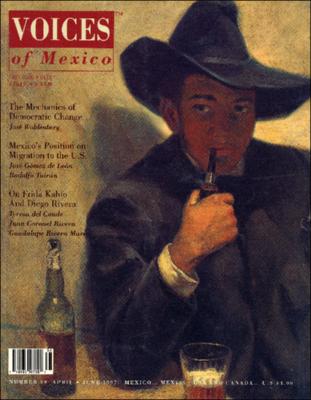Mostrar el registro sencillo del ítem
Voices of Mexico
| dc.rights.license | http://ru.micisan.unam.mx/page/terminos | |
| dc.contributor.editor | Bugeda Bernal, Diego Ignacio | |
| dc.contributor.other | Velasco Montante, Astrid | |
| dc.date.accessioned | 2018-12-04T00:49:26Z | |
| dc.date.accessioned | 2022-02-17T00:16:12Z | |
| dc.date.available | 2018-12-04T00:49:26Z | |
| dc.date.available | 2022-02-17T00:16:12Z | |
| dc.date.issued | 1997 | |
| dc.identifier.issn | 0186-9418 | |
| dc.identifier.uri | https://ru.micisan.unam.mx/handle/123456789/16746 | |
| dc.format | application/pdf | |
| dc.format.extent | 116 pp. | |
| dc.language.iso | eng | |
| dc.publisher | Universidad Nacional Autónoma de México, Coordinación de Humanidades, Centro de Investigaciones sobre América del Norte | |
| dc.relation.isformatof | ||
| dc.relation.haspart | Our Voice / Márquez Padilla, Paz Consuelo; The Reform of the State: the Political-Electoral Reform in Mexico/ Pérez Fernández del Castillo, Germán; The Mechanics of Democratic Change / Woldenberg, José; Mexico Allows Dual Nationality/ Gómez-Robledo Verduzco, Alonso; On Nahuatl Wisdom; Translating Culture: The US:-Mexico Fund for Culture / Yudice, George; The Wealth of Culture: Diego Rivera in the National Archives / Galeana, Patricia; What Role for Promotion of Culture and the Arts? / Rodríguez Tirado, Alvaro; Frida´s Fiestas / Rivera, Guadalupe; Colle, Marie-Pierre; Frida Kahlo Once Again / Conde, Teresa del Three Extra Bonuses and Another Brouhaha: two of Diego Rivera´s Aesthetic Decisions /Coronel Rivera, Juan / Diego Rivera, Cubist/ Ganado Kim, Edgardo; Gallardo, Luis; Diego on Frida / Rivera, Diego; Frida on Diego/ Kahlo, Frida; Drug trafficking: Mexican Negotiation Strategies / Toro, María Celia; Mexico´s Position on Migration to the U.S. / Gómez de León, José; Tuirán, Rodolfo; Identity and Globalization: Mexico"s Relationship with the United States / de Olloqui, José Juan; Canada"s Contradictory International Economic Activities / Dávalos López, Elisa; Diego Rivera in Paris / Rivera, Guadalupe; Yolloxóchitl, the Flower of the Heart / Aranda, Andrés; Clasing, Virginia; Anahuacalli: the Diego Rivera Museum / Riveroll, María Fernanda; Diego Rivera and Frida Kahlo In the Dolores Olmedo Museum / Montiel Ziegler, Elsie; Dolores Olmedo Patiño; Diego and Frida in San Angel / Garduño Pulido, Blanca; Rudos contra científicos: la Universidad Nacional durante la Revolución Mexicana / MacGregor, Josefina; A la sombra del ángel / Riveroll, María Fernanda | |
| dc.relation.requires | Adobe Acrobat | |
| dc.subject | HUMANIDADES Y CIENCIAS DE LA CONDUCTA | |
| dc.title | Voices of Mexico | |
| dc.audience | Estudiantes | |
| dc.audience | Maestros | |
| dc.audience | Investigadores | |
| dc.audience | Otros públicos | |
| dc.audience | Medios de comunicación | |
| dc.contributor.assistanteditor | Montiel Ziegler, Elsie | |
| dc.contributor.businessmanager | Ocampo, Consuelo | |
| dc.contributor.copyeditorandtranslator | Dashner Monk, Heather | |
| dc.contributor.designer | Rocha, Daniela | |
| dc.contributor.editorinchief | Bugeda Bernal, Diego Ignacio | |
| dc.contributor.layout | Ediciones del Equilibrista | |
| dc.contributor.printer | Artes Gráficas Panorama | |
| dc.contributor.salesandcirculationmanager | Villareal Carrillo, Pilar | |
| dc.coverage.placeofpublication | México | |
| dc.date.printcopyrighted | [ca. 1997] | |
| dc.description.extract | President Clinton was reelected Last November 5, and the Democratic Party recovered its ability to occupy the Oval Office for two straight terms. On the other hand the Republicans were able to retain control of both houses of Congress. Obviously, the next four years will bring either the U.S. founding fathers" dream or their worst nightmare: If President Clinton is able to negotiate properly with Congress, and Congress, in turn, acts responsibly, the checks and balances of the system may function in all their splendor with both branches of government monitoring each other"s activities. If President Clinton is able negotiator, if Congress is dominated by the most conservative wing of the Republican Party or if Clinton can- not unify Democratic congressional votes, then there may be a gridlock like the one in late 1995. Nevertheless, experience has shown that the supposedly great conservative contract. With America revolution lost its momentum precisely when it took such a hard line on the budget negotiations, paralyzing decision making. For the American people, the Republican-dominated Congress carne out the tower, not President Clinton. The best thing, then, for both the president and the Congress will be to develop ejective bipartisan policies to jointly build a bridge toward the United States of the twenty-first century. This issue of Voices of Mexico covers several topics in its Politics" section that we think will be of interest to our readers. Today in Mexico, voices clamor for the executive to balance its prerogatives vis-á-vis the other branches of government; at the same time, the disappearance of the exaggerated presidentialism that intervenes and imposes its position in everything is feared. Fernando Escalante and Juan Molinar discuss the changes and possibilities of the executive branch from two different perspectives, in their analyses of presidentialism in Mexico and its recent changes. Carlos Martínez Assad explains that in today"s Mexico the fiercest electoral competition takes place at the municipal level in his opinion, the National Action Party strategy has yielded important results since they now govern 13 of the 20 most populated municipalities in the country. He also emphasizes that municipal governments must have sufficient resources if federalism is to be consolidated. José Luis Valdés-Ugalde warns us that democracy is fungible in Latin America, stressing the role that the military has played and underlining the fact that civilian governments have to deal with this vow strong political actor who interferes with democratic processes. Viña del Mar, Chile, hosted the IV Iberoamerican Summit of Heads of State and Government in November 1996 this is the sixth consecutive year that this kind of high level meeting has been held a demonstration both of the good relations among countries in the region and of the democratic advances which allow for a more fruitful dialogue. The VI Summit, reviewed in this issue, touched on such important topics as governability and democracy drug trafficking corruption, the fight against poverty and the Helms-Burton Act, which was unanimously condemned The section “Science, Art and Culture" continues to bring our readers the work of important Mexican painters, both men and women. Masks, dlolls, cardboard horses and little girls are some of the images that María Izquierdo gives us with beautiful brush strokes. Teresa Del Conde article gives special significance to the work of this great Mexican painter. Janet Long article explains Mexico contribution to Mediterranean cuisine, delving in great detall into how corn and tomatoes, among other products, aided in making their diet more nutritious. José Luis Martínez describes the Boturini Collection which included several pre-Columbian codices fundamental to understanding Mexico before the arrival of the Spanish. "The Splendor of Mexico" section is centered on the art and culture of indigenous Mexico. Amates are part of the spectacular, rich and varied artisan tradition in Mexico. Color, image and texture mix in Mexican indigenous artists work. Jonathan Amith argues that amate painting is a demonstration of Nahua culture which should no longer be considered mere crafts, but great works of art. Pedro Tezontémoc followed in Antonin Artaud"s footsteps 60 years after the French intellectual walked the Tarahumara Mounains. Like his predecessor, Tezontémoc captures the enigmatic beauty of the Tarahumara indians in fantastic photographs which we present here together with bis article reflecting on art and life. Maricela González Cruz details the mastery of woodworking from Apaseo el Alto. Raúl Valadez Azúa"s description of the cul-tural and ritual importance of some of the birds in pre-Hispanic Mexico allows us to better imagine that world. Wars and regional conflicts bring about violations of human rights, threatening the spirit of the UN"s Universal Declaration of Human Rights. Lilian Alvarez de Testa describes the results ofmeetings which aim to give new vigor, definition and specific tactics in Latín America to the protection of human rights. This article begins our "Social" section, which deals with contemporary issues. The social fabric of many countries is prey to the problem of narcotics. A vow complex system of power, corruption and money permeates many countries. María Celia Toro analyzes the inner workings of just such an intricate structure to go deeply into the strategies Mexico has developed to face this problem, which taints its relations with the United States. In the economy, the energy sector has dominated national debate. We have included a key speech by Energy Minister Jesús Reyes Heroles, in which he lays out the new strategy for developing petrochemicals. Víctor Rodríguez and Rosío Vargas center their contribution on the modernization of the gas industry. In her article "Maquikdoras and Free Trade," Monica Gambrill explains how U.S. protectionist tariffs have limited manufacture in maquiladoras almost exclusively to assembly work, creating its corollaries, an unskilled work force and low wages. Gambrill suggests that for both Mexico and the United States to really benefit from the free trade agreement, wages must rise and Mexican domestically produced intermediary goods be integrated into manufacturing in the maquiladoras. In our "Canadian Issues" section, Mexico Ambassador to Canada Sandra Fuentes uses a historic analysis to go into current relations between Mexico and Canada. She considers that the signing of the trilateral free trade agreement introduced great dynamism into the trade, political and social relations between both nations. In the "Literature" section, we present two examples of Mexican novel writing. Sensuality, secrecy and psychology interact strangely in an ephemeral relationship described by Jorge Volpi, one of our young Mexican novelists who has ventured to break with traditional narrative. In this issue, we share with our readers a chapter of his novel Temperamento melancólico (MelancholicTemperament). One cannot but take the time to delight in the intermingling of words that describe Fatma, the fascinating character created by the talented Mexican author Alberto Ruy Sánchez in "The Hand," a chapter of his novel Mogador. Los nombres del aire (Mogador. The Names of the Air). Rafael Fernández de Castro takes up the recent U.S. elections in our "United States Affairs" section. He argues that President Clinton’s main challenge is giving "both the militias and the ethnic and religious fundamentalists their place" in the political life of the nation. He also states that the one-hundred-and-fifth Congress will intervene more in the bilateral relations between Mexico and the United States because of mechanisms like the certification of the anti-drug trafficking efforts, the report on human rights and the evaluation of NAFTA implementation. Our "Ecology" section continues to present the richness of Mexico"s flora and fauna: Salvador Arias Montes writes about the great varia), of cacti in Mexico and the economic and cultural benefits accrued from these surprising plants. Xcaret, an ecological park in the state of Quintana Roo, is a wonderful comer of Mexico where visitors can enjoy ruin, sea, flora and fauna. With this article, Voices of Mexico gives our readers a glimpse of our country"s great natural beauty. This time in "Museums," we invite you to visit the Museum of Mexican Medicine, located in a spectacular colonial building in downtown Mexico City. Its different rooms, with its especially important exhibit of traditional herbal treatments, take us through the history of Mexican medicine. | |
| dc.discipline.clase | Multidisciplina | |
| dc.educationlevel | Medio superior | |
| dc.educationlevel | Superior | |
| dc.educationlevel | Posgrado | |
| dc.identifier.cisan | VOM_1997_0039 | |
| dc.identifier.conacyt | CONACYT | |
| dc.relation.issued | 39, April-June, 1997 | |
| dc.rights.accesslevel | openAccess | |
| dc.rights.creativecommons | http://creativecommons.org/licenses/by-nc-nd/4.0 | |
| dc.subject.conacyt | 4 | |
| dc.type.spa | other | |
| dc.view.accesslevel | DISPONIBLE |
Ficheros en el ítem
Este ítem aparece en la(s) siguiente(s) colección(ones)
-
Números completos [125]
MiCISAN, Repositorio Institucional
Hecho en México, todos los derechos reservados 2018. Esta página puede ser reproducida con fines no lucrativos, siempre y cuando no se mutile, se cite la fuente completa y su dirección electrónica. De otra forma, requiere permiso previo por escrito de la institución.
Sitio Web administrado por: Centro de Investigaciones sobre América del Norte • micisan@unam.mx








